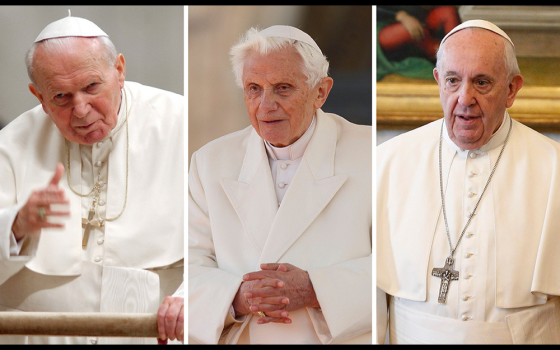The United States’ Hispanic/Latino bishops issued a letter to all immigrants this week. And, I can see from the combox that some readers took umbrage at my post about former Sen. Rick Santorum dissenting from Church teaching on the issue, especially my statement that “to be clear, the reason the Church defends immigrants is the exact same reason the Church defends the unborn: They are human beings, children of God, who, as the GOP candidates like to remind us, receive their rights from God not from the government.” Here is what we used to call a “teaching moment.”
The bishops open their letter with these words: “We the undersigned Hispanic/Latino Bishops of the United States wish to let those of you who lack proper authorization to live and work in our country know that you are not alone, or forgotten. We recognize that every human being, authorized or not, is an image of God and therefore possesses infinite value and dignity. We open our arms and hearts to you, and we receive you as members of our Catholic family.”
It tells you something significant, and something good, about these bishops that they address immigrants directly. Too often in debates on immigration, everyone talks about immigrants, but not to them. The bishops, in multiple statements, have told the country and its politicians that they stand in solidarity with immigrants, but here they are announcing their solidarity to the immigrants themselves. It is a mark of respect as well as of pastoral sollicitude. The letter, like a sacrament, effects what it’s words signify. The letter does not only call for solidarity, it is itself an expression of solidarity.
The second paragraph of the bishops’ statement also displays something that one rarely sees in debates about immigration: an expression of gratitude to imigrants for their personal courage, their commitment to their families and their faith, and for all they do to enrich “the welfare of our nation in the economic, cultural and spiritual arenas.” The bishops go on to warn against scapegoating immigrants during these years of economic difficulty, and in fact just last night I saw a television ad from an anti-immigrant group that suggested immigrants were taking away jobs from U.S. citizens, which is at best a tendentious claim and one which, in terms of Catholic social teaching mistakenly puts competition at the heart of its analysis rather than solidarity.
The bishops go on to state, “It pains and saddens us that many of our Catholic brothers and sisters have not supported our petitions for changes in the immigration law that will protect your basic rights while you contribute your hard work to our country. We promise to keep working to bring about this change.” These words echo the speech Archbishop Jose Gomez gave at the Knights of Columbus convention earlier this year in which he called upon the Knights to view th immigration issue as Catholics, not as Democrats or Republicans. As I mentioned at the time, the Knights of Columbus, many of whom are the classic white, ethnic swing voters who will decide the next election, should be true to the organization’s origins and join this fight for comprehensive immigration reform with all the fervor and the funds that they have joined the fight for defending the unborn. They should heed Archbishop Gomez’s, and now the entire slate of U.S. Hispanic bishops.
So should Rick Santorum. It is more than a little ironic that after years of accusing the Catholic left of being “cafeteria Catholics,” so few on the Catholic right have spoken out against Santorum’s – and others – dissent on this issue. Either we can all pick and choose or no one can.
Now, onto my statement relating the politics of abortion with the politics of immigration. Of course, there is a difference between abortion and immigration. But, both the Church’s commitment to the unborn and her commitment to immigrants is rooted in her commitment to human dignity. Put differently, and repeating a frequent theme in these pages, anthropology comes before ethics which, in turn, comes before politics. That is how Catholics need to approach all political issues. We start with human dignity – well, actually we start with the Trinity, and from the invitation to participate, by adoption, in the divine life of the Trinity, which is the doctrinal ground of human dignity – and then move on to discern the ethical significance of our decisions and our perspectives. From there, we can move on to evaluate the political choices we should make. It is easy for me to see how the bishops, in their statement, follow this course. I cannot see how someone can follow this method of approaching an issue and, like Santorum, conclude we should simply deport undocumented immigrants. The most important thing to know about an undocumented worker is not their legal status. It is that they are a human being, a child of God. It is that they are a parent, a brother, a daughter, an uncle. It is that they are on the PTA. It is that they are in the pew in front of you. It is that they harvested the food on your table or re-paved the road on which you drive to work. They are not simply, as the GOP candidates like to call them these days, “illegals.”
As I was writing this, I received an email from Deal Hudson with a link to an article that he and his colleague Matt Smith, just published at the American Spectator. I do not buy his attempt to create daylight between the position of the USCCB and the position of Archbishop Gomez: an individual’s speech, especially someone as gifted with words as Abp Gomez, is always more lively than a committee-generated text. But, I will say this: If Deal Hudson and I agree on an issue, then it truly is worthy of note. (And, as soon as I return from Hades with those ice cubes….) I think it speaks to the distinctive way Catholics have come to appreciate the issue. And, let me commend Deal for staking out turf that will cause discomfort to some of political allies. If he can see this, why can’t Santorum?


